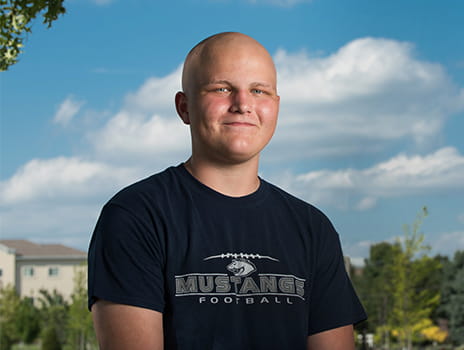Following His Physician's Game Plan


August 31, 2018
When Brock Anderson was little, he loved to try on his older brother's football helmet and jersey. He couldn't wait for his turn on the gridiron. By 2nd grade, Brock followed in his brother's cleats, playing tackle football in the Blue Valley Football Club league.
"We weren't too worried about their safety," says his dad, Mark. "Our boys are big, athletic guys." But in 8th grade, during a typical football practice, Brock experienced something he had never felt before. "I had a crushing headache right after one of the drills," he says. "I thought it might be a concussion."
Fortunately, Brock didn't hesitate to inform his coach. And his coach didn't hesitate to take Brock out of practice.
Brock's coach also contacted the head athletic trainer at nearby Blue Valley North High School.
Athletic trainers from The University of Kansas Health System play an integral role in the middle and high schools within 5 districts, including Blue Valley, Shawnee Mission, De Soto and Lansing. They attend practices and home games. They educate students, coaches, parents and teachers about concussion awareness and treatment. And they act as a resource for coaches and school nurses.
"It was such a relief to meet with an athletic trainer the same day Brock was hurt," says Julie, Brock's mom. The trainer immediately performed tests to look for symptoms of a concussion. He recommended they contact David Smith, MD, as soon as possible. Dr. Smith is a primary care sports medicine physician and concussion specialist at The University of Kansas Health System's Sports Medicine and Performance Center.
"Quick access to a sound diagnosis and the right care is vital to recovering from a concussion," says Dr. Smith, who also serves as the health system's youth sports medicine medical director. "Each concussion, each patient and each care plan is different."
Dr. Smith develops an individual treatment plan designed to get the student back in the classroom and on the field – as soon and as safely as possible. "About half of concussion patients are better in just 7 to 10 days," says Dr. Smith. "In fact, most concussion patients are better in 3 weeks. But the younger the athlete, the longer it takes the brain to heal."
The trainer helped Brock, his parents, teachers and coaches understand the importance of following Dr. Smith's instructions. "I felt like a bad parent, telling my son not to do homework," Jule jokes. "At first, there was no TV, no cell phone and no reading. Brock gradually returned to his normal activities."
Brock has advice for other kids with concussions. "Do what your doctor tells you – even if it doesn't sound like fun! You'll get better."
Brock only missed 3 games with his concussion. But in his freshman year at Blue Valley North, he injured his knee. Once again, the athletic trainer and Dr. Smith coordinated their efforts to help Brock get back to his favorite sport.
Then the unthinkable happened.
Brock was diagnosed with stage IV Hodgkin lymphoma, the same cancer former Chiefs player Eric Berry beat. A recent scan showed chemotherapy was getting the job done. "The Mustang football team has rallied around Brock," Julie says. "The camaraderie is incredible."
Brock's dad is proud of his determination. "If you come to a game, he's the bald kid on the sidelines," says Mark. "He has attended every practice even though he can't play. And he cannot wait to get back on the field."
Dr. Smith agrees. "With his concussion and knee injury, Brock has 2 wins," says Dr. Smith. "We know Brock will go 3-0."